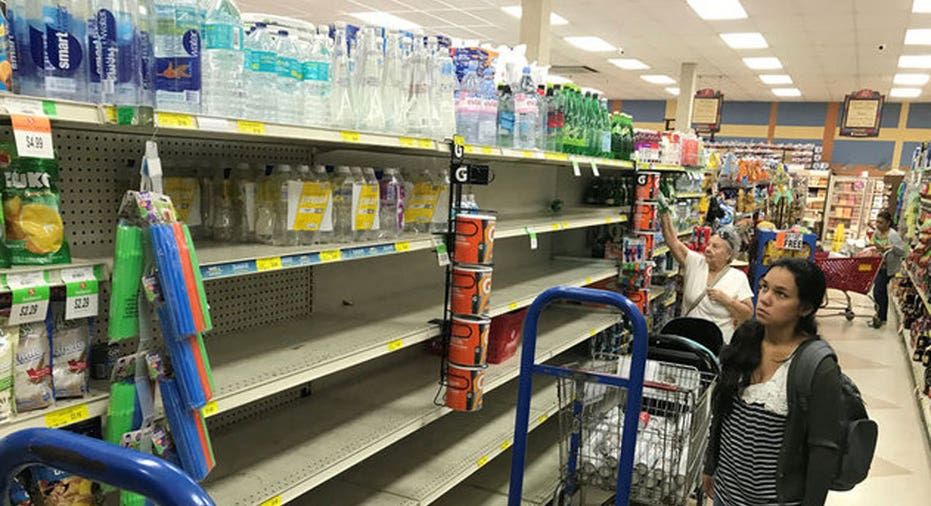Hurricane Irma batters Caribbean as Fla. braces for weekend landfall

Monster Hurricane Irma slammed across islands in the northern Caribbean on Wednesday, packing a potentially catastrophic mix of pounding winds, raging surf and rain en route to a possible Florida landfall at the weekend.
Irma is expected to become the second powerful storm to thrash the U.S. mainland in as many weeks but its precise trajectory was uncertain. Hurricane Harvey killed more than 60 people and caused as much as $180 billion in damage after hitting Texas late last month.
The eye of Irma, a Category 5 storm with winds of 185 miles per hour (295 km per hour), passed over the island of St. Martin, east of the U.S. territory of Puerto Rico, on Wednesday, the National Hurricane Center (NHC) in Miami said. Category 5 is its highest category.
In Puerto Rico's capital of San Juan, a handful of people stood on the wind-whipped shore of a beachfront park on Wednesday morning to take a last look at the ocean before seeking shelter.
"I am worried. This is going to be a huge storm, bigger than I have ever seen," said Angelica Flecha, 45.
She has stocked her second-floor home with food and water and put metal storm shutters on the windows, but was worried about a storm surge on the island, which is under a hurricane warning.
Most businesses were closed and streets were almost empty. Cars packed parking lots of stores that were still open, with shoppers stuffing ice and water into their trunks.
Puerto Rico's Governor Ricardo Rossello urged the island's 3.4 million residents to seek refuge in one of 460 hurricane shelters.
It was not immediately clear how much damage Irma had done as it swept west.
Two American tourists in the French territory of Guadeloupe, Loren Ann Mayo and Rachel Scharett, told CNN they were weathering the storm in their hotel room's bathroom.
Following a loud cracking noise, Mayo said, "The balcony snapped and is now hanging on by one little piece of wire."
Emergency officials on Antigua and Barbuda reported three injuries but minimal damage, with some roofs blown off. Communications between the islands were cut off, officials said.
"MUCH TO FEAR"
Several other Leeward Islands, including Anguilla, Montserrat, St. Kitts and Nevis, as well as the U.S. and British Virgin Islands, and the Dominican Republic were under a hurricane warning.
In Paris, the French government said it had delivered water and food to two of its overseas territories, St. Martin and St. Barthelemy, and that emergency response teams would be sent once the storm had passed.
Power was knocked out on both islands, according to prefecture officials on Guadeloupe.
French Interior Minister Gerard Collomb said at least four buildings were damaged, including the prefecture, a fire brigade barracks and a police building and that low-lying regions had been flooded.
"For now we're not aware of any deaths," Collomb told reporters in Paris.
French Overseas Territories Minister Annick Girardin said "there were was much to fear" for citizens who had not heeded calls to seek safety in more secure buildings.
Irma ranked as one of the five most powerful Atlantic hurricanes in the last 80 years and the strongest Atlantic storm recorded by the outside the Caribbean Sea and Gulf of Mexico, according to the NHC.
U.S. President Donald Trump said on Twitter on Wednesday that he was monitoring the storm closely. He approved emergency declarations for Florida, Puerto Rico and the U.S. Virgin Islands, mobilizing federal disaster relief efforts, the White House said.
Authorities in the Florida Keys ordered a mandatory evacuation of visitors to start at sunrise on Wednesday. Public schools throughout South Florida were ordered closed, some as early as Wednesday.
Residents of low-lying areas in densely populated Miami-Dade County were urged to move to higher ground.
Florida Governor Rick Scott said there would be more mandatory evacuations around the state as Irma approached and as surges were expected to reach 10 feet (3 meters).
"We can rebuild your home, we can't rebuild your life," Scott said on ABC's "Good Morning America."
Irma could be worse than Hurricane Andrew, which devastated the state in 1992. "We don't know exactly where this is going to hit," he told ABC. "It sure looks like it's going to bear down right in the middle of Florida."
Federal Emergency Management Agency Administrator Brock Long, speaking on the "CBS This Morning" program, said he was confident FEMA could handle Irma, even as he acknowledged potential staffing strains so soon after Hurricane Harvey struck Texas.
Residents of Texas and Louisiana were still recovering from Harvey, which struck Texas as a Category 4 hurricane on Aug. 25. It dumped several feet of rain, destroying thousands of homes and businesses, and displaced more than 1 million people.
(By Scott Malone; Additional reporting by Brendan O'Brien in Milwaukee, Ian Simpson and Susan Heavey in Washington, and Richard Lough in Paris; Editing by Catherine Evans and Jeffrey Benkoe)



















